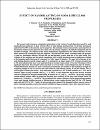Effect Of Sand Blasting On Soda Lime Glass Properties
Abstract
The present work is based on a simulation in laboratory of the erosion of a soda lime glass caused by sand blasting during sandstorms. It deals with the effects of sand blasting duration (from 0 to 60 min) and impact angle (from 0 to 90°) on the material and its properties. The principal erosion characteristics and properties of the material studied are the mass loss, the erosion rate, the surface roughness, the optical transmission and the mechanical strength. The influence of the optical transmission degradation on the relative efficiency of solar panels protected by eroded glass was also examined. The sand used has mostly a rounded shape and presents a grain size distribution between 300 and 500 µm and hardness greater than that of the glass tested. The evolution of the roughness and the optical transmission with variable duration present an important variation at the beginning and tends towards a constant level after about 20 minutes. The mass loss is function of the sand blasting duration and the impact angle. It is maximal for an impact angle of 90°. Fracture strength (up to 300 min) indicates that there is an important drop in strength values (about 13%) after 30 minutes with a significant dispersion. The strength values tend then to level out with a reduced dispersion after 60 minutes. Weibull distribution function was used to characterize statistically the variation of the mechanical strength by comparing samples in the as received state and eroded by sand blasting during 30 and 60 minutes. The as received glass Weibull plot shows a large dispersion expressed by a low Weibull modulus (m = 5.41) and a relatively higher average strength value (smoy = 76 MPa). A lesser dispersion and a lower average strength value were obtained for the glass eroded during 30 minutes (m = 8.2 and smoy = 66 MPa). The average strength remains almost constant while the dispersion becomes much reduced for the glass sand blasted during 60 minutes (m = 10.4 and smoy = 64 MPa). The variation of the relative efficiency of glass protected solar panels versus sand blasting duration (seen up to 300 min) shows a slow regular decrease until 0.91 for a 90° impact angle and until 0.95 for 30°. Finally, the microscopic observations of the damaged surfaces showed traces of lateral cracking formation, cracks interaction from different impacts and also craters after material removal.


